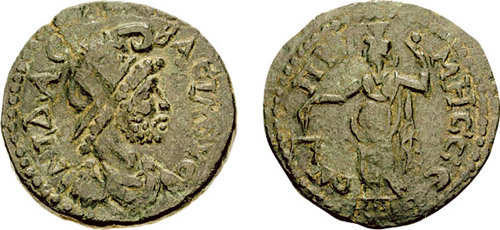
The mythic king Midas of Phrygia and Lydia may not have invented coinage, as one version of the story goes, but his name became a byword for the consequences of foolish choices. He was the judge in a musical contest between Apollo and Marsyas (or Pan in another version). When he decided against the Olympian, Apollo reacted to his lack of musical taste and bad judgment by giving him ass's ears. Midas wore a cap from that point onward. The tale of Midas is more familiarly known as a cautionary warning about the acquisition of excessive wealth and subsequent downfall by excessive greed. The king, who had been a gracious host to Silenos, the campanion of Dionysos, was promised a boon by the god, and implored Dionysos for unending wealth. Midas was granted the "Golden Touch" whereby everything he touched turned to the precious metal. This proved a benefit with a double edge, since no morsel of food could pass his lips without transforming. Starving and pleading for relief, the king was instructed to bathe in the waters of the river Pactolus, which washed away the curse and resulted in the river sand turning to grains of gold. The gold of the Pactolus would be the source of much of the natural electrum used in the first archaic coinages of Asia Minor, and Midas would become a local hero of Phrygia and Lydia, despite his lack of foresight.
PHRYGIA, Prymnessus.
Autonomous Issue. Time of Gallienus, 253-268 AD. Æ 24mm (7.30 gm, 7h). Draped bust of King Midas right, wearing Phrygian cap / Dikaiosyne standing left, holding scales in right hand, sceptre in left. Von Aulock, Phrygiens II, 962 (same dies); SNG Copenhagen 663 (same dies); SNG von Aulock 3938 var. (reverse legend).
Rare mythological type.